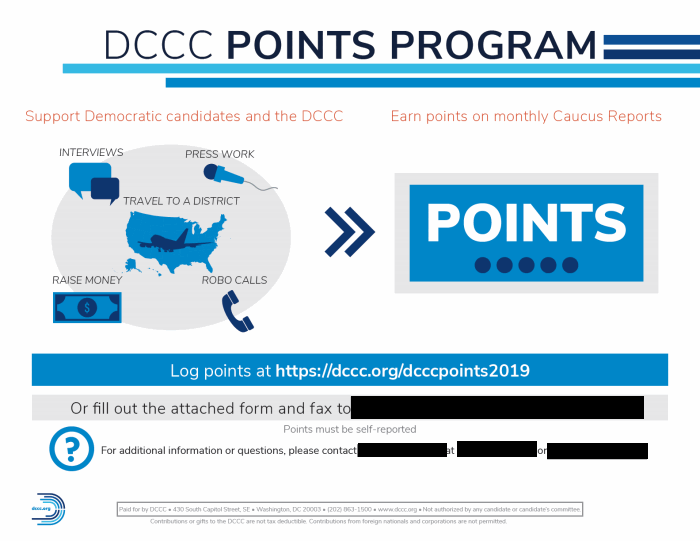 House Democrats are woefully behind on dues owed to the Democratic Congressional Campaign Committee, according to an internal party document provided to The Intercept. The rank-and-file’s lagging participation in the party’s money chase is being made up for, however, by House Speaker Nancy Pelosi’s prolific buckraking. By the end of June, she had raised the DCCC more than $43,000,000.
House Democrats are woefully behind on dues owed to the Democratic Congressional Campaign Committee, according to an internal party document provided to The Intercept. The rank-and-file’s lagging participation in the party’s money chase is being made up for, however, by House Speaker Nancy Pelosi’s prolific buckraking. By the end of June, she had raised the DCCC more than $43,000,000.
Otherwise, only 11 party members had paid their dues in full, according to the document, a July draft of the “Member Dues Report” for the 2019-2020 election cycle. The delinquency doesn’t necessarily mean they won’t pay at some point during the cycle (though some certainly won’t), but the DCCC, naturally, would prefer to have the money as early as possible, for budgeting and planning purposes. Members, meanwhile, prefer to hold on to their campaign cash as a signal of strength, to deter potential opponents considering a bid.
Party members are doing no better in the DCCC’s points system, a complex, lesser-known ranking that rewards a variety of activities Democrats can do to hold the majority.
The “DCCC Points Program,” as it is dubbed in an internal document, rewards members for their involvement in recruitment efforts and kicks them points if they raise money for the party’s House campaign arm, vulnerable incumbents, and candidates vying to flip swing districts. Pelosi is sitting atop the leaderboard with 279 points, while most members have none or just a few.
Power is accumulated in the House by raising and dispersing money to colleagues, a dynamic pioneered by Pelosi’s quasi-mentor, the late Rep. Phil Burton, who once held Pelosi’s seat; it’s now a bipartisan practice. This has been formalized with the DCCC’s decades-old practice of asking members to pay “dues” to the party committee in charge of reelection efforts and reallocating that money to contested races. Democrats in leadership positions, or who chair so-called money committees, are required to pay higher dues than back benchers. Members are also given a target amount of money they are expected to raise directly for the DCCC, which is separate from their dues payment.
Members of Congress who pay their dues and hit their targets are rewarded with better committee assignments in the future, and more favorable treatment of legislation they author, than members who shirk their dues. Members who don’t pay, for instance, are less likely to have their bills or amendments get a floor or committee vote.
The points system the DCCC has worked out adds layers of nuance to the money chase. According to the internal document describing the points program, raising more than $15,000, or hosting an event that raises that amount for vulnerable incumbents, known as front-line members or Red-to-Blue candidates — Democrats running in swing seats — is worth five points. Traveling to a district to campaign for a candidate, having a staff member volunteer to campaign in a district, and hosting a get-out-the-vote phone bank are each worth three points. For two points, members can do press or fundraising work on behalf of a candidate, including phone or television interviews with local papers, town hall meetings, radio ads, robo calls, or finance meetings. The members are able to log their fundraising activities using an online form.
The point system was created during the 2010 cycle, at the urging of members of the Congressional Black Caucus, who argued that a strict focus on money raised, without accounting for other activity that benefits the party electorally, was unfair to members who represented poorer districts. The point system, though, is still overshadowed by the dues sheet. “It’s not really something anyone pays attention to,” said one House Democrat of the points program. “It’s not nearly as important as how much you’ve directly given to them.”

